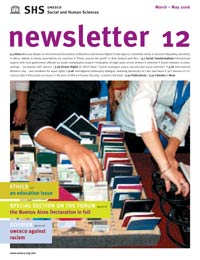| |
 |
 |
|
 |
 |
| Newsletter 12 |
| |
| The quarterly SHS Newsletter provides information on the work of UNESCO in the field of social and human sciences. |
 |
| Ethics and Education / Special Section on the Forum - Buenos Aires Declaration / Dossier: UNESCO against Racism – March-May 2006 (English | Français | Русский) |
 |
 From thought to action From thought to action
The French philosopher Henri Bergson (1859-1941) wrote that “One should act as a man of thought and think as a man of action”. I share his view that this is the way to build effective connections between research and policy, between academics and policy makers. These actors and activities are not identical. Far from it. Nonetheless, by taking their differences into account, by putting them to work together in mutual enrichment, a true space of dialogue can be established.
Such was the purpose of the International Forum on the Social Science – Policy Nexus, organized by UNESCO and by the governments of Argentina and Uruguay, which was held in Buenos Aires, Córdoba, Montevideo and Rosario from February 20 to 24 2006. This issue of the SHS Newsletter covers the Forum and its main outcomes. As emphasized by the Declaration calling for a new approach to the social science – policy nexus adopted at the close of the Forum – the full text of which is reprinted here –, “the social sciences have a crucial contribution to make in formulating development policy”.
The success of this innovative event gives fresh life to the aspiration to new spaces of dialogue at all levels. For whether a country is rich or poor, an active or a passive participant in globalization, whether a region is weak or powerful, at peace or in conflict, there is no escaping the need to produce autonomous thinking. This function cannot be delegated, for it concerns the very birth of the intelligence of nations. The process launched in Buenos Aires will contribute to the growth and to the dynamic exchange of such intelligence. Just as UNESCO, from its very creation, has sought to make its contribution.
For the mandate given to UNESCO by its member states to promote social science coincides with the urgent concerns of the day, at a time when the speed, scale and impact of social transformations are unprecedented.
Without knowledge and analytical capacity, without the power they can put in the hands of justice and human rights, not just social cohesion, but also security, and indeed peace, are threatened. An exemplary case in this respect is the struggle against racism, which is also covered in this issue on the occasion of the International Day for the Elimination of Racial Discrimination. Action within the variations coalitions of cities, to which UNESCO has given strong impetus, is inseparable from improved understanding of the dynamics that give birth to racism and the processes that can counter it.
To a greater or lesser extent, this claim runs through the themes covered in this issue. Whether referring to clarification of bioethical issues and implementation of the principles adopted by the international community, to women’s rights, or to social cohesion in the city, a key idea keeps resurfacing: groping in the dark is a poor technique for ambitious action. There are two symmetrical forms of political irresponsibility: failing to act, pending illusory certainty, and rushing ahead regardless of consequences. Between the two, there is a noble and urgent task: to take responsibility for clear-sighted action, in full recognition of the inherent limits of knowledge.
That, precisely, is “acting as a man of thought”. Such needs to be UNESCO’s everyday commitment…
Pierre Sané
Assistant Director-General
for Social and Human Sciences
p.2 Editorial: From thought to action
p.3 Ethics
> Moscow Conference discusses the Universal Declaration of Bioethics and Human Rights
> UN Inter-Agency Committee on Bioethics meets in Geneva
> Biosafety and ethics in Africa: debate in Ghana launched by six countries
> “Ethics around the world” in New Zealand and Peru
> Ethics – a matter of education
p.7 Social Transformations
> International experts with local government officials on Gangjin revitalization project
> Evaluation of eight years of one of MOST’s networks
> Social cohesion in urban settings – UN-HABITAT with UNESCO
Special Section: International Forum on the Social Science – Policy Nexus
> Buenos Aires Declaration calling for a new approach to the social science – policy nexus
p.18 Human Rights
> Interview with Dr Ulrich Maly, Mayor of Nuremberg (Germany): “racism endangers peace, security and social cohesion”, also available in HTML format
> Dossier: The fight against discrimination
> International Women’s Day – SHS mobilizes for equal rights
p.28 Interregional philosophy dialogue: debating democracy in Cairo and Seoul
> 30th session of 21st century talks
> Discussion on issues in the Horn of Africa
> Human Security: a UNESCO-led book
p.30 Publications
p.32 Calendar • News
|
 |
 |
 Email this page Email this page  Printable version Printable version
|
 |
|
|


